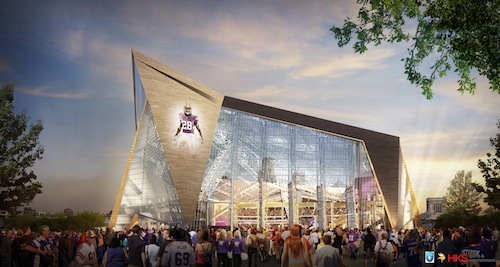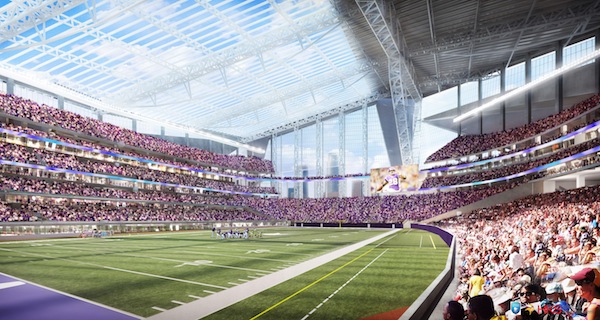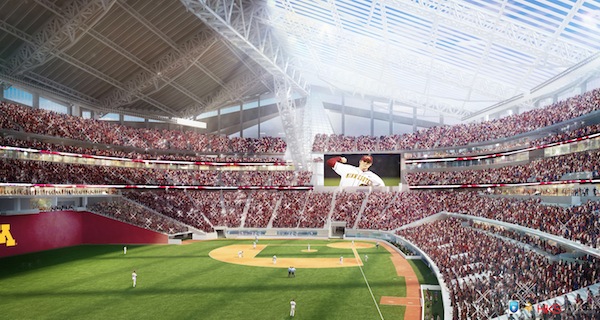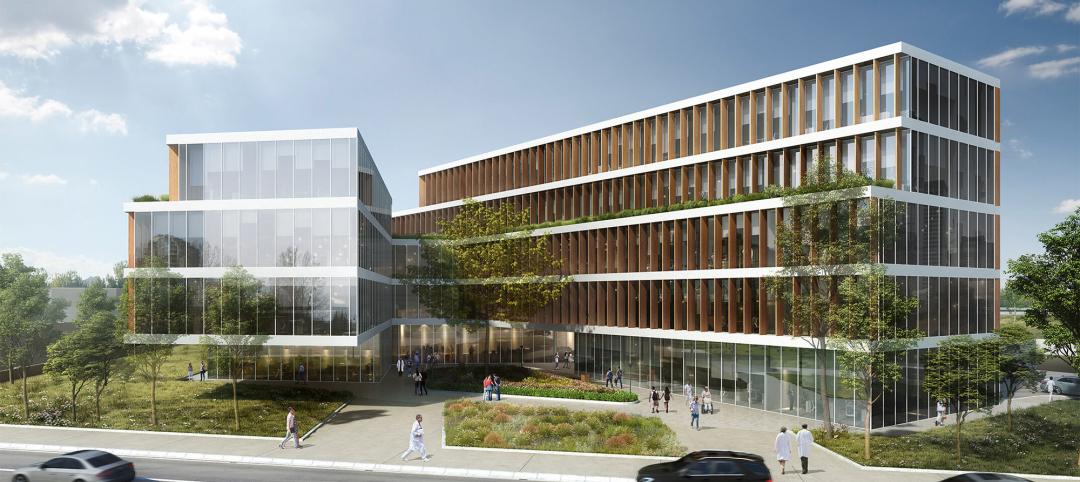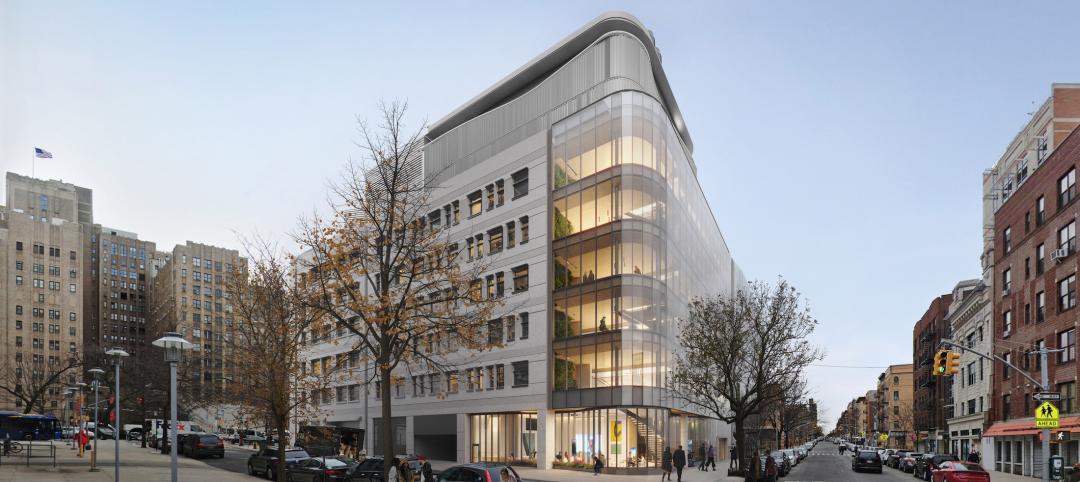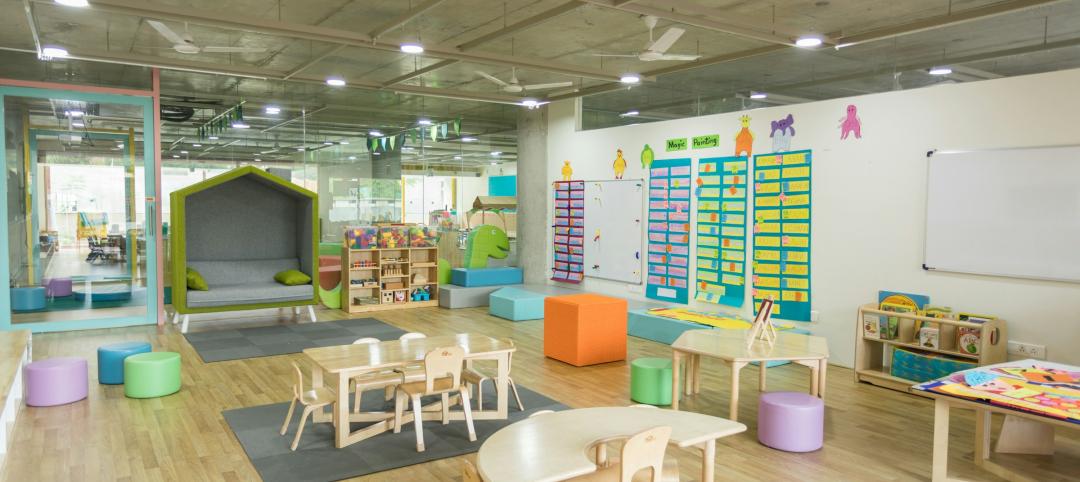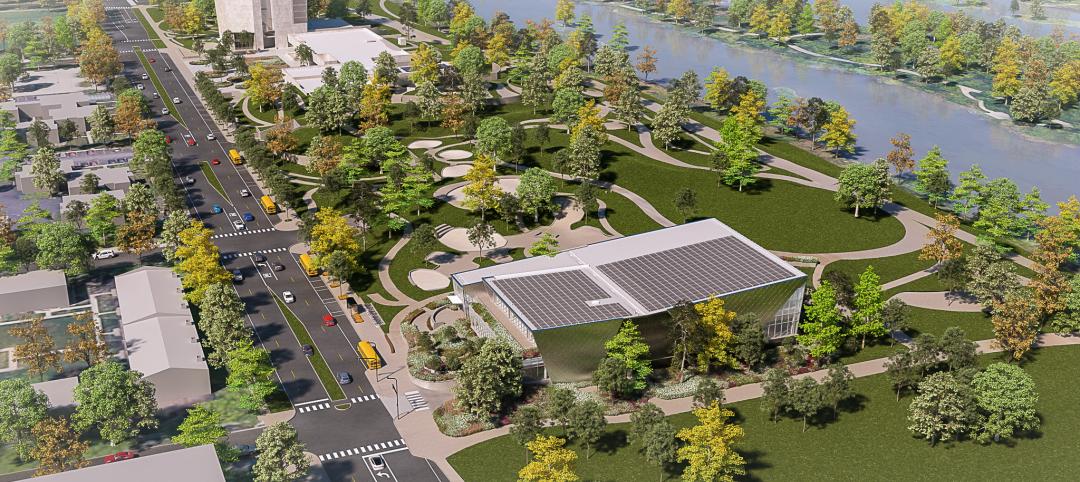The Minnesota Sports Facilities Authority (MSFA), the Minnesota Vikings and HKS Sports & Entertainment Group have unveiled the design of the State’s new multipurpose stadium in Minneapolis, a major milestone in getting the $975 million stadium built on time and on budget.The design package will now be submitted to the Minneapolis Stadium Implementation Committee and the City of Minneapolis for review.
Described as an authentic structure influenced by its Minnesota location, the new stadium exhibits a bold, progressive design that combines efficient functionality with stunning architecture. With a soaring prow, the largest transparent roof in the world, and operable doors that open to the downtown skyline, the facility’s openness and sleek geometric exterior will make it unlike any other stadium in the country.
“The design reflects the true story of the Minnesota community with its international style driven by climatic response and energy conservation,” said Bryan Trubey, design principal, HKS Sports & Entertainment Group. “The interior volume makes it the most versatile, multi?use building in the country with the most advanced digital age technology.”
Throughout the design process, HKS identified four major influencers that shaped the functional form and architecture of the building: climate, geography, history of important civic structures and technology. The recent pattern of modern and progressive physical form in Minnesota will continue with this facility, beginning with the roof. With ethylene tetrafluoroethylene (ETFE) on the roof’s southern half, visitors will feel as if they are sitting outside without being exposed to the elements. Sustainable characteristics will be utilized to produce lower operating costs in winter and summer, and the stadium’s sloped roof will be the most efficient roof structure in the nation, a remarkable engineering feat considering the snow?loading requirements with Minnesota’s climate.
The new stadium will be capable of hosting more events than any other large stadium in the world. Despite its versatility, the stadium’s football configuration puts the fans closer to the field than in any other NFL stadium.
“Tonight’s unveiling showcases a bold, iconic design delivered by HKS,” said Vikings Owner/President Mark Wilf. “Not only is this facility unique to Minnesota, but the stadium will also provide Vikings fans with the best game?day experience in the NFL, which has always been our goal.”
“Vikings fans will be closer to the action than any stadium in the country,” said Vikings Owner/Chairman Zygi Wilf. “The combination of operable end walls with a clear roof and large windows throughout the facility will give fans the opportunity to experience the best of both worlds: an outdoor feel with protection from the elements.”
Just as important as the experience for all users of the stadium is the building’s impact on the surrounding neighborhoods. Following Monday’s design presentation, the MSFA voted unanimously to approve the design and submit the details of the stadium to the Minneapolis Stadium Implementation Committee and the City of Minneapolis for review.
“We wanted a design that encourages a connection into the neighborhoods, that will spur economic development and that will act as a destination rather than a barrier,” said Michele Kelm?Helgen, Chair of the Minnesota Sports Facilities Authority. “The design, the amount of glass and light and the transparency makes this an iconic building that will attract a Super Bowl, NCAA basketball and baseball tournaments, world class concerts and other great events. The benefits to the state’s economy will be incredible.”
Groundbreaking for the new 65,000?seat stadium will take place in October 2013, and demolition of the Metrodome will begin early in 2014. The new stadium is scheduled to be open in time for the Vikings 2016 season.
“We look forward to bringing this wonderful design to life and beginning construction in a few short months,” said John Wood, senior vice president at Mortenson Construction, the stadium builder. “This stadium will be built for Minnesota by Minnesotans, and it will create an estimated 7,500 construction? related jobs and deliver substantial business opportunities for hundreds of local subcontractors and suppliers.”
The Building Team also includes engineer Thornton Tomasetti and construction manager Mortenson.
Facility facts at a glance:
-
Approximately 1.6 million square feet.
-
65,000 seats, including some of the closest in the NFL; expandable to 73,000 for a Super Bowl.
-
Up to 125 suites and 7,500 club seats, including suites and clubs at the field level, some of which will put fans closer to the sideline than in any other NFL stadium.
-
Seven levels, including two general admission concourses with 360?degree circulation and various views into the bowl.
-
Highest quality HD video boards in the NFL located in both the east and west end zones and video ribbon boards throughout the interior of the seating bowl.
-
Over 1,200 HD flat screen televisions throughout the concourse for all fans in attendance to view the game.
-
Capability to host more events than any other large stadium in the world, including NFL football and a Super Bowl, MLS soccer, NCAA basketball and baseball, high school sporting events, motocross, concerts, conventions, marching band competitions.
-
Access points to the city and stadium site from all four sides of the stadium.
-
Large west plaza (over two acres in size) for game day, non?game day and seasonal public gatherings as a connection to the downtown corridor.
-
Lightest and most efficient roof structure in the nation for a major new stadium, which will include a single large steel super truss providing primary support for the main long span roof.
-
Largest clear ethylene tetrafluoroethylene (ETFE) roof in the world and the first on a stadium in the nation, allowing connection to the outdoors from a climate?controlled environment.
-
Largest glass pivoting doors in the world that will open to the west plaza.
-
Application for LEED?certified status.
-
Parking ramps with skyways from the north and south sides of the stadium and connections from the facility to the downtown skyway system.
(http://www.vikings.com/news/article-1/Vikings-MSFA-and-HKS-Group-Unveil-New-Multi-Purpose-Stadium-Design/a22f251d-0e66-4c42-aab3-a32269114660)
Related Stories
Multifamily Housing | Apr 12, 2024
Habitat starts leasing Cassidy on Canal, a new luxury rental high-rise in Chicago
New 33-story Class A rental tower, designed by SCB, will offer 343 rental units.
Student Housing | Apr 12, 2024
Construction begins on Auburn University’s new first-year residence hall
The new first-year residence hall along Auburn University's Haley Concourse.
K-12 Schools | Apr 11, 2024
Eric Dinges named CEO of PBK
Eric Dinges named CEO of PBK Architects, Houston.
Construction Costs | Apr 11, 2024
Construction materials prices increase 0.4% in March 2024
Construction input prices increased 0.4% in March compared to the previous month, according to an Associated Builders and Contractors analysis of the U.S. Bureau of Labor Statistics’ Producer Price Index data released today. Nonresidential construction input prices also increased 0.4% for the month.
Healthcare Facilities | Apr 11, 2024
The just cause in behavioral health design: Make it right
NAC Architecture shares strategies for approaching behavioral health design collaboratively and thoughtfully, rather than simply applying a set of blanket rules.
K-12 Schools | Apr 10, 2024
A San Antonio school will provide early childhood education to a traditionally under-resourced region
In San Antonio, Pre-K 4 SA, which provides preschool for 3- and 4-year-olds, and HOLT Group, which owns industrial and other companies, recently broke ground on an early childhood education: the South Education Center.
University Buildings | Apr 10, 2024
Columbia University to begin construction on New York City’s first all-electric academic research building
Columbia University will soon begin construction on New York City’s first all-electric academic research building. Designed by Kohn Pedersen Fox (KPF), the 80,700-sf building for the university’s Vagelos College of Physicians and Surgeons will provide eight floors of biomedical research and lab facilities as well as symposium and community engagement spaces.
K-12 Schools | Apr 10, 2024
Surprise, surprise: Students excel in modernized K-12 school buildings
Too many of the nation’s school districts are having to make it work with less-than-ideal educational facilities. But at what cost to student performance and staff satisfaction?
Industrial Facilities | Apr 9, 2024
Confessions of a cold storage architect
Designing energy-efficient cold storage facilities that keep food safe and look beautiful takes special knowledge.
Cultural Facilities | Apr 8, 2024
Multipurpose sports facility will be first completed building at Obama Presidential Center
When it opens in late 2025, the Home Court will be the first completed space on the Obama Presidential Center campus in Chicago. Located on the southwest corner of the 19.3-acre Obama Presidential Center in Jackson Park, the Home Court will be the largest gathering space on the campus. Renderings recently have been released of the 45,000-sf multipurpose sports facility and events space designed by Moody Nolan.


